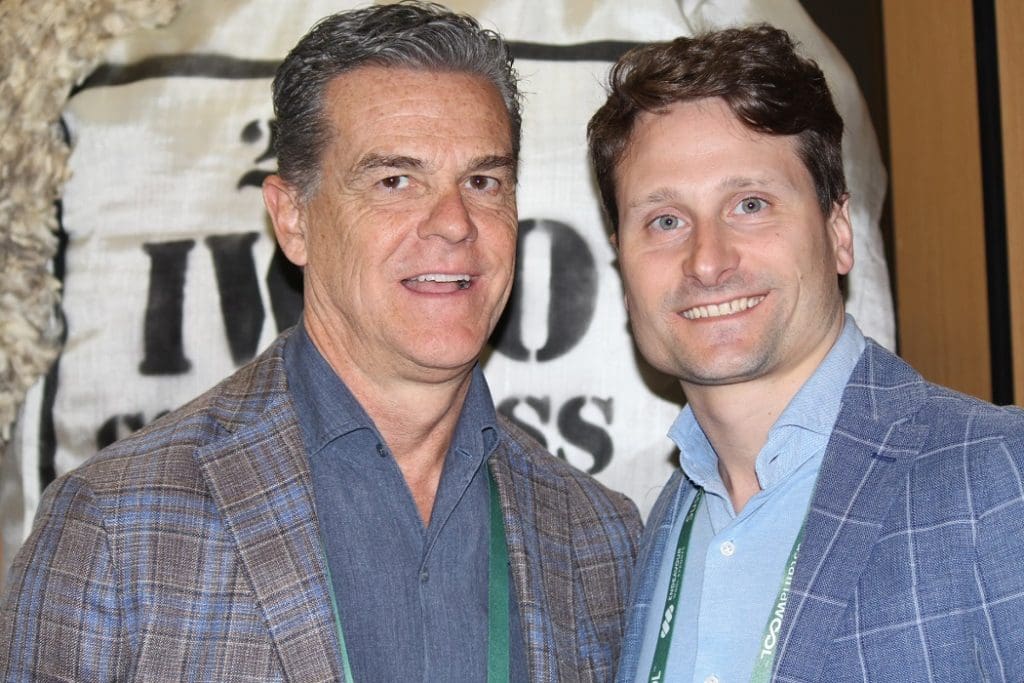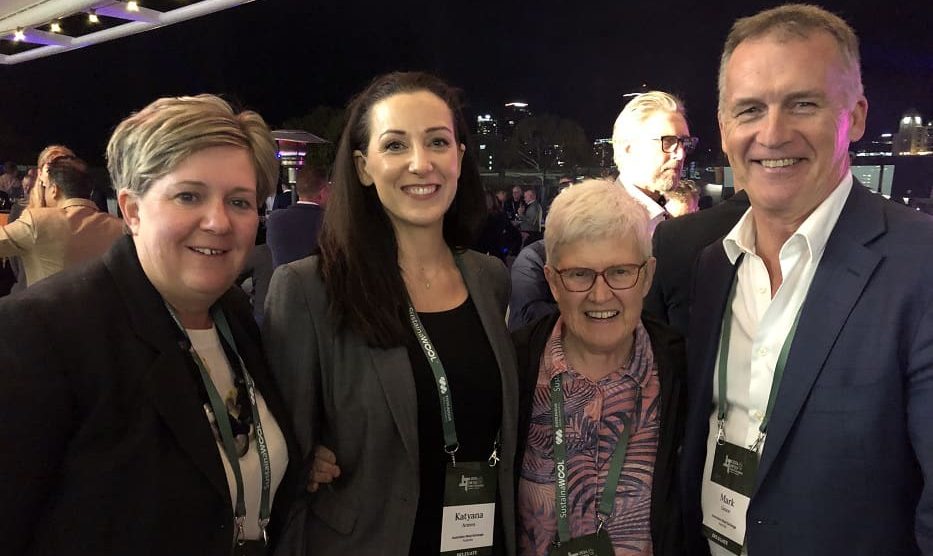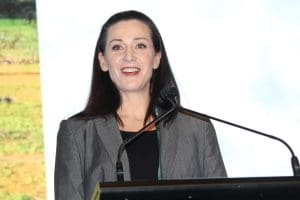REVAMPED wool integrity program – the Australian Wool Sustainability Scheme – could help increase world demand for the natural fibre, according to a European top maker.
The Australian Wool Exchange’s new version of its SustainaWOOL Integrity Scheme was yesterday launched at the International Wool Textile Organisation Congress in Adelaide by AWEX general manager, brand and equity Katyana Armen.
The new scheme includes a clearer delineation between its non-mulesed wool stream – to be branded SustainaWOOL – and the breech modification with pain relief stream – ResponsiWOOL, meaning mulesing sheep producers will not be able to sell wool under the SustainaWOOL brand and must use appropriate pain relief.
The new scheme is unique among world integrity programs for its inclusion of a wool quality component. It will be in place with new standards and processes from 1 July 2024 and will not be doing group certifications.
Global AWSS adoption could boost wool demand

European top maker Claudio Lachio and his son Matteo at IWTO Congress in Adelaide: take AWSS to the world.
Italian Wool Trade Association president Claudio Lacchio said he believes global adoption of the Australian Wool Sustainability Scheme could grow world wool demand.
“Because once you have only one scheme, you forget about all the other issues and you concentrate on the promotion of wool and other products that can be included in the wool area.”
Mr Lacchio said the current wool prices and demand levels leading to the current decline in the Australian Merino flock and movement to shedding sheep and cropping could to some extent be blamed on complications with the proliferation of certification schemes, driving customers away from wool.
“I’m absolutely convinced.
“We could be prepared to pay something to get rid of the other schemes and see an industry scheme prevail and be the only one.”
Clear separation between mulesed and non-mulesed wool
Mr Lacchio liked the clear separation between the mulesed and non-mulesed wool streams, saying the previous tiered scheme was “too confusing” to customers.
“The market couldn’t understand the differences.”
He said it was significant that mulesed wool producers using pain relief would not now have their wool branded ‘SustainaWOOL’.
The other important aspect of the new scheme is that wool quality is taken into account, Mr Lacchio said.
“None of the private schemes take (wool) quality into account.”
Mr Lacchio said it is also very important that the AWSS is industry-owned.
“Because you take all the private potential conflicts of interests out of it.”
Mr Lacchio would like to see the AWSS go global and be made available to wool growers in other countries.
“In my opinion, wool has nothing to defend; it’s natural, renewable and sustainable, but the proliferation of private integrity schemes — there are probably 10 in the market – has led to the situation where people, our clients are confused.
“’Why do you have 10 different schemes, what do you have to hide?’ they say,” he said.
“It becomes like selling branded tops – they are not really traceability and sustainability schemes.
“Whereas this (AWSS) comes from the industry and it has wool quality taken into account,” he said.
“If this becomes by any means international, it means that wool will be sold within one integrity scheme.”
Mr Lacchio made the point that the former SustainaWOOL Integrity Scheme and South Africa’s Sustainable Cape Wools Standard had already joined forces to ensure greater integrity and traceability of sustainably certified wool sources.
“I did in many cases sell SustainaWOOL certified tops with 100 percent South African wool in them.”
He said there was no need for all wool-producing countries to agree to AWSS, but if the wool from the three or four major wool-producing nations is sold under only one scheme then the industry could concentrate on marketing and promotion, and better prices for growers.
“Whereas nowadays if you come to Europe and you spend a week with me in the office you will hear nothing about quality or prices, but ‘have you got this scheme, what is the piece of paper, what is the transaction certificate’ – it’s frustrating, a total distraction.”
In his business’ office, of the five staff is employed full-time on integrity scheme certification servicing.
“Which is a nonsense, who is going to pay me for that?
“I cannot charge it back to the clients.”
Mr Lacchio said he would rather spend time selling tops on the unique attributes on the different styles of superfine wool or its provenance “to start some story about wool against the other fibres, rather than worrying about a piece of paper, which is very expensive.”
Concerns about audit integrity
Mr Lacchio also raised concerns about the auditing rigor and chain of custody of some overseas-owned integrity schemes operating in Australia.
“Many systems are not credible anymore and group certification (option) is a joke.
“It is falling down because I know of at least five or six clients in Italy who think this (group certification) is neither credible nor reliable,” he said.
He said the AWSS certification of greasy wool with a chain of custody will save cost, is more credible and effective.
“I think Europe and Italy will be very supportive.”
Mr Lacchio said South Africa is already co-operating with AWEX on wool integrity, and he was aware that AWEX is holding discussions with South America – in particular Uruguay. He conceded that all the wool producing countries, especially New Zealand, might not want to adopt the AWSS standards.
But if AWEX only managed to get widespread AWSS adoption in Australia, South Africa and South America, the scheme could potentially be the major global integrity scheme, he said.
Australia is main AWSS focus at this stage

English Merino breeder Lesley Prior is dwarfed by the AWEX team at IWTO Adelaide, from left, SustainaWOOL program manager Kathleen Allan, general manager, brand and equity Katyana Armen and AWEX CEO Mark Grave.
During the IWTO Congress, Mr Lacchio said an industry-owned integrity scheme from Australia is long overdue and asked AWEX chief executive officer Mark Grave about the potential for wool growers in other countries to use the AWSS.
“We are open to a discussion about it, but our focus is on the Australian market and we are not closing that out.
“It is called the Australian Wool Sustainability Scheme for a reason and that is our charter, so therefore that is our prime focus,” Mr Grave said.
“But for those with whom we have already had discussions with, who are interested to know what we are doing, we welcome that conversation and will certainly explore what opportunities there are.”
Standard Wools (South Africa) co-owner Paul Lynch said everybody in the industry across world is “actually on the same vessel going in the same direction” and collaboration between countries on standards is vitally important.
“The last thing we want to have is the processors coming with three, four or five different systems from three or four or five different countries to actually make their life more difficult.
“So I think it is vitally important that all the different countries, if there is something out there, and SustainaWOOL has been very transparent about that, to try and actually get systems so the systems are all similar, especially for the processors so it is a seamless process for them to receive wool.”
Mr Grave said he liked to think that the AWSS sets a standard that the industry “can borrow and also link up with.”
“We can’t stop the competitive nature of the industry, that should never be the case, but certainly on systems ….. there is an opportunity to share.”
Future of wool depends on meeting market needs

AWEX general manager, brand and equity Katyana Armen
Ms Armen said the future success of wool depends on meeting the needs of the market.
“Sustainability is front and centre in that discussion.”
The AWSS reflects this and the needs of Australian growers, their climatic condition and unique production systems, regulatory requirements and best practice standards, she said.
Ms Armen said the AWSS sets a new standard for sustainable wool production and sourcing, extending AWEX’s commitment “to keep that live as the market continues to evolve so that we can all move forward in the same direction.”
In a separate media release, Mr Grave said the Australian Wool Sustainability Scheme is a fit-for-purpose integrity system that independently verifies sustainability practices from farm to fibre to meet market expectations.
“A review in 2023 highlighted the need to evolve the former SustainaWOOL program to meet the changing needs of the marketplace.
“In the Australian Wool Sustainability Scheme, we have a robust program underpinned by innovative practices on-farm, which are informed by research, backed by industry, regulated by government and demanded by customers,” he said.
“The Australian Wool Sustainability Scheme is fully aligned to industry sustainability frameworks and commitments, including the Australian Sheep Sustainability Framework and the Australian Agricultural Sustainability Framework, and builds upon existing industry programs, leveraging growers’ hard work through one accreditation to meet market requirements.”
The outcomes-focussed Australian Wool Sustainability Scheme Grower Standards will outline the performance criteria and evidence options wool growers can use to demonstrate their on-farm sustainability commitment and credentials. The Standards include four sustainability pillars; caring for the environment, sheep, people and industry as well as clip preparation and integrity requirements, AWEX said.
AWEX said an expert panel made up of qualified, respected and experienced subject matter experts has been appointed to provide guidance on standards and evidence for the scheme.
”Certification through the Australian Wool Sustainability Scheme will capture the extensive sustainability on-farm practices of wool producers in one place, in a way that suits the needs of buyers, processors and consumers of Australian wool, and by a trusted partner in AWEX,” Mr Grave said.
“Australian Wool Sustainability Scheme accreditation will capture the wide range of sustainability practices to demonstrate the responsible stewardship of natural resources; health and wellbeing of sheep; care for people, customers and communities; and vitality and resilience of the industry, while upholding the highest quality standards and integrity for Australian wool.”
Mr Grave said maintaining market access is central to the Australian Wool Sustainability Scheme.
“As regulations and market requirements change around the world, this fit-for-purpose Australian sustainability scheme will provide the evidence to meet those changes.
“Critically, the Australian Wool Sustainability Scheme meets the needs of brands – credibly verifying the wool inputs they source, satisfying their sustainability and quality needs, and providing trusted traceability foundations to support reporting requirements through the use of WoolClip and eBale.”
Current SustainaWOOL Integrity Scheme Grower members will be contacted about the changes and the opportunity to transition to accreditation with the Australian Wool Sustainability Scheme

This is, in my personal opinion, the right step. For sure, all the industry will be very happy to have a trusted, reliable, not time-consuming, not expensive nor inefficient certification as the other private certification products.
In my opinion, the Australian auction system of greasy wool should receive thanks for this. I will support the AWSS as much as possible.
The predominant tone from this article is “could”. Nothing in wool ever changes that much.
At last, moving in the right direction overall.